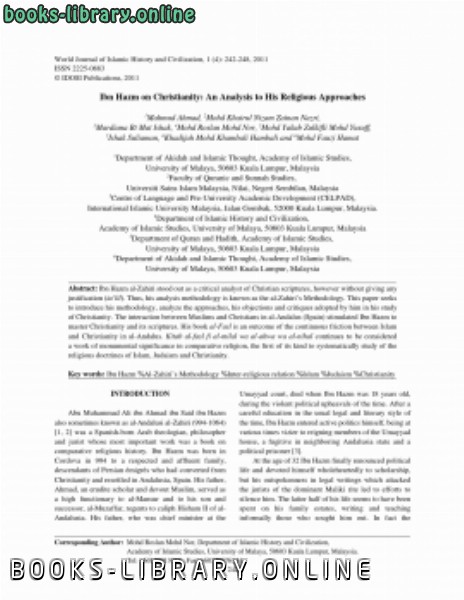كتاب Ibn Hazm on Christianity An Analysis to His Religious Approaches
Mahmud Ahmad, Mohd Khairul Nizam Zainan Nazri, 1 2 Mardiana Bt Mat Ishak, Mohd Roslan Mohd Nor, Mohd Yakub Zulkifli Mohd Yusuff, 3 4 5 Ishak Suliaman, Khadijah Mohd Khambali Hambali and Mohd Fauzi Hamat 5 6 6 Department of Akidah and Islamic Thought, Academy of Islamic Studies, 1 University of Malaya, 50603 Kuala Lumpur, Malaysia Faculty of Quranic and Sunnah Studies, 2 Universiti Sains Islam Malaysia, Nilai, Negeri Sembilan, Malaysia Centre of Language and Pre-University Academic Development (CELPAD), 3 International Islamic University Malaysia, Jalan Gombak, 52000 Kuala Lumpur, Malaysia. Department of Islamic History and Civilization, 4 Academy of Islamic Studies, University of Malaya, 50603 Kuala Lumpur, Malaysia Department of Quran and Hadith, Academy of Islamic Studies, 5 University of Malaya, 50603 Kuala Lumpur, Malaysia Department of Akidah and Islamic Thought, Academy of Islamic Studies, 6 University of Malaya, 50603 Kuala Lumpur, Malaysia Abstract: Ibn Hazm al-Zahiri stood out as a critical analyst of Christian scriptures, however without giving any justification (ta’lil). Thus, his analysis methodology is known as the al-Zahiri’s Methodology. This paper seeks to introduce his methodology, analyze the approaches, his objections and critiques adopted by him in his study of Christianity. The interaction between Muslims and Christians in al-Andalus (Spain) stimulated Ibn Hazm to master Christianity and its scriptures. His book al-Fasl is an outcome of the continuous friction between Islam and Christianity in al-Andalus. Kitab al-fasl fi al-milal wa al-ahwa wa al-nihal continues to be considered a work of monumental significance in comparative religion, the first of its kind to systematically study of the religious doctrines of Islam, Judaism and Christianity-
من مقارنة الأديان فرق ومذاهب وأفكار وردود - مكتبة المكتبة التجريبية.

قراءة كتاب Ibn Hazm on Christianity An Analysis to His Religious Approaches أونلاين
معلومات عن كتاب Ibn Hazm on Christianity An Analysis to His Religious Approaches:
Mardiana Bt Mat Ishak, Mohd Roslan Mohd Nor, Mohd Yakub Zulkifli Mohd Yusuff, 3 4 5
Ishak Suliaman, Khadijah Mohd Khambali Hambali and Mohd Fauzi Hamat 5 6 6
Department of Akidah and Islamic Thought, Academy of Islamic Studies, 1
University of Malaya, 50603 Kuala Lumpur, Malaysia
Faculty of Quranic and Sunnah Studies, 2
Universiti Sains Islam Malaysia, Nilai, Negeri Sembilan, Malaysia
Centre of Language and Pre-University Academic Development (CELPAD), 3
International Islamic University Malaysia, Jalan Gombak, 52000 Kuala Lumpur, Malaysia.
Department of Islamic History and Civilization, 4
Academy of Islamic Studies, University of Malaya, 50603 Kuala Lumpur, Malaysia
Department of Quran and Hadith, Academy of Islamic Studies, 5
University of Malaya, 50603 Kuala Lumpur, Malaysia
Department of Akidah and Islamic Thought, Academy of Islamic Studies, 6
University of Malaya, 50603 Kuala Lumpur, Malaysia
Abstract: Ibn Hazm al-Zahiri stood out as a critical analyst of Christian scriptures, however without giving any
justification (ta’lil). Thus, his analysis methodology is known as the al-Zahiri’s Methodology. This paper seeks
to introduce his methodology, analyze the approaches, his objections and critiques adopted by him in his study
of Christianity. The interaction between Muslims and Christians in al-Andalus (Spain) stimulated Ibn Hazm to
master Christianity and its scriptures. His book al-Fasl is an outcome of the continuous friction between Islam
and Christianity in al-Andalus. Kitab al-fasl fi al-milal wa al-ahwa wa al-nihal continues to be considered
a work of monumental significance in comparative religion, the first of its kind to systematically study of the
religious doctrines of Islam, Judaism and Christianity
للكاتب/المؤلف : .
دار النشر : .
عدد مرات التحميل : 5658 مرّة / مرات.
تم اضافته في : الثلاثاء , 26 مارس 2019م.
حجم الكتاب عند التحميل : 47.6 كيلوبايت .
تعليقات ومناقشات حول الكتاب:
Mahmud Ahmad, Mohd Khairul Nizam Zainan Nazri, 1 2
Mardiana Bt Mat Ishak, Mohd Roslan Mohd Nor, Mohd Yakub Zulkifli Mohd Yusuff, 3 4 5
Ishak Suliaman, Khadijah Mohd Khambali Hambali and Mohd Fauzi Hamat 5 6 6
Department of Akidah and Islamic Thought, Academy of Islamic Studies, 1
University of Malaya, 50603 Kuala Lumpur, Malaysia
Faculty of Quranic and Sunnah Studies, 2
Universiti Sains Islam Malaysia, Nilai, Negeri Sembilan, Malaysia
Centre of Language and Pre-University Academic Development (CELPAD), 3
International Islamic University Malaysia, Jalan Gombak, 52000 Kuala Lumpur, Malaysia.
Department of Islamic History and Civilization, 4
Academy of Islamic Studies, University of Malaya, 50603 Kuala Lumpur, Malaysia
Department of Quran and Hadith, Academy of Islamic Studies, 5
University of Malaya, 50603 Kuala Lumpur, Malaysia
Department of Akidah and Islamic Thought, Academy of Islamic Studies, 6
University of Malaya, 50603 Kuala Lumpur, Malaysia
Abstract: Ibn Hazm al-Zahiri stood out as a critical analyst of Christian scriptures, however without giving any
justification (ta’lil). Thus, his analysis methodology is known as the al-Zahiri’s Methodology. This paper seeks
to introduce his methodology, analyze the approaches, his objections and critiques adopted by him in his study
of Christianity. The interaction between Muslims and Christians in al-Andalus (Spain) stimulated Ibn Hazm to
master Christianity and its scriptures. His book al-Fasl is an outcome of the continuous friction between Islam
and Christianity in al-Andalus. Kitab al-fasl fi al-milal wa al-ahwa wa al-nihal continues to be considered
a work of monumental significance in comparative religion, the first of its kind to systematically study of the
religious doctrines of Islam, Judaism and Christianity
significance and the major contribution of Ibn Hazm, present in his time. His study on Christianity is based on
which he developed cannons for a proper and critical the concept of common sense (sense perception),
study of religion. At the same time he was a pioneer figure statements and argumentation by the authoritative text
in comparative religion and the Imam of al-Zahiri’s fiqh (the Gospels) and a comparative study with the belief
and his lasting impact on the development of that concepts of the historical Christians sects; i.e. Arius,
discipline. Bawls al-Shamshati, Macdunius [6].
As a jurist, Ibn Hazm was one of the strongest According to Ibn Hazm none of these historical
spokesmen for the Zahiri, or literalist, school of legal Christian sects discussed Trinity and equality of Jesus
interpretation, in local opposition in Spain to the with God (Incarnations), nor they discussed the issues of
predominant Maliki’s school [4]. This insistence upon a the personality of God as the Father, Jesus as the Son and
meticulous basis in the Qur’an and the Traditions for legal the Holy Ghost. Thus, the present concept of Christian
decisions naturally led Ibn Hazm to philology and a theology has no basis from the authoritative written text
heightened consciousness of the importance of the ( la yasih lahum dalil- la min injilihim wa la min ghairihi
Arabic language for Muslim. He was aware of Aristotelian min al-kitab) [7].
logic but saw it as definitely a handmaiden to religion, to In his study of Christianity, Ibn Hazm does not
be used to reconcile the Qur’an and the Traditions of the approach them in term of chronological sequence or in
Prophet on the rare occasions when these did not seem to consideration of their geographical location. Rather, he
agree on the surface. In term of characters, Ibn Hazm was takes main doctrine of the teaching and discussed their
a sensitive man, always favored frankness and mutual relation to or deviation from his view of the truth,
understanding, a moralist and confronted all the sensibility and textual basis. Ibn Hazm accepts the theory
inconsistencies of mankind. He was passionate defender of naskh (abrogation) in the Shariah, but he reject bada’.
of the truth and tried to base all his theories on For him, abrogation implies a providential act of God and
incontrovertible evidence. bada’ implies the change of mind in God because of
At last Ibn Hazm tackles on the sciences of his unknown and uncontrollable conditions and
predecessors, contemporaries and some of his circumstances.
successors. As discussed by A.G Chejne, in his writing Ibn Hazm divides all of mankind’s conception of
Ibn Hazm al-Andalusi wa Mawqifuhu min al Ulum, [5] reality and truth using division of sects and definitions of
although Ibn Hazm’s views on and his harsh criticism of religious doctrine, analyzing them by using authoritative
the socio-religious system of his day were abhorrent the texts and sense of perception as basis of agreement or
majority of the Muslims, who were committed to existing disagreement. His length of discussion, standard of
juridical-theological school, medieval bibliographical data refutation and the language while discussing all religious
on him is relatively abundant. Information about Ibn Hazm ideologies are based on differences and divergences from
recorded by Hispano-Arabic and later, by Eastern authors Islam. He affirms that Islam is the religion of truth and its
is inadequate in many respects, but medieval sources do truth-claim is based on textual basis, reason and sense
offer valuable insights into how the man and his ideas perception. In his typology of religious traditions, Ibn
were viewed at that point in the intellectual History of Hazm starts from general errors in philosophies and
Islam. ideologies and moves to the particular errors of major
Ibn Hazm remained a controversial and outspoken religious traditions, particularly Christianity and Judaism.
figure, however and an assortment of his works were Ibn Hazm does not obviously give the details or
publicly burned by al-Mu‘tadid in nearby Seville. His highlight the background of the emergence of different
reputation survived intact and when he died at Manta Christian sects. He did not attempt a through exposition
Lisham in August 1064, he was already viewed as one of of their doctrinal disagreements and controversies, nor
the greatest Muslim intellectuals of the age. did he provide us with the history of ecumenical councils
Ibn Hazm and His StudyToward Christianity: Ibn Hazm’s provide the sources of the Christian schisms. He
study of religions is based on what may be called a mentioned directly the sects without highlighting where
textual, empirical and common sense methods. He he obtained the sources.
analyzed religious data according to the rules of logic and Ibn Hazm argued Christianity on the skeptical ground
authoritative scripture available in his period and engaged and the irrational basis of the Christian doctrine as
himself in disputation with the other religious traditions understood by the remaining Christian sects in his period,
 مهلاً !
مهلاً !قبل تحميل الكتاب .. يجب ان يتوفر لديكم برنامج تشغيل وقراءة ملفات pdf
يمكن تحميلة من هنا 'تحميل البرنامج'

نوع الكتاب : pdf.
اذا اعجبك الكتاب فضلاً اضغط على أعجبني و يمكنك تحميله من هنا:


كتب اخرى في مقارنة الأديان
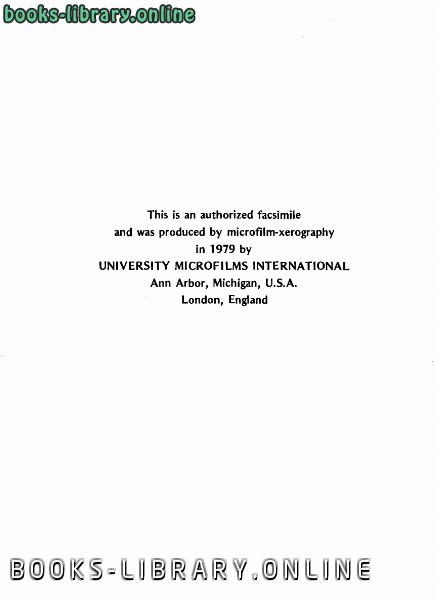
Medieval Jewish Muslim Contribution to the Academic Study of Religion A Study in the Methodology of Saadia Al Fayyuni and Muhammad Al Shahrastani PDF
قراءة و تحميل كتاب Medieval Jewish Muslim Contribution to the Academic Study of Religion A Study in the Methodology of Saadia Al Fayyuni and Muhammad Al Shahrastani PDF مجانا
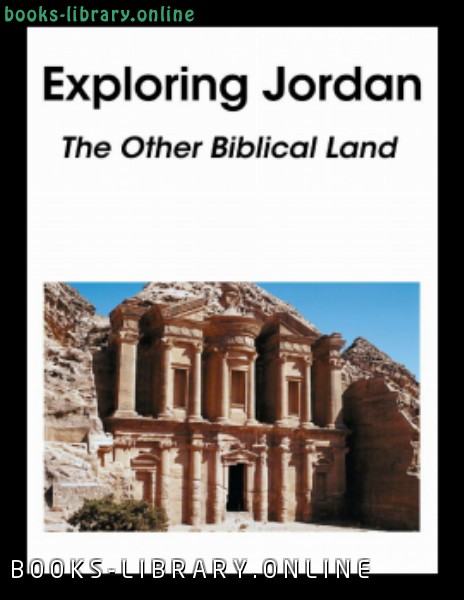
Exploring Jordan The Other Biblical Land PDF
قراءة و تحميل كتاب Exploring Jordan The Other Biblical Land PDF مجانا
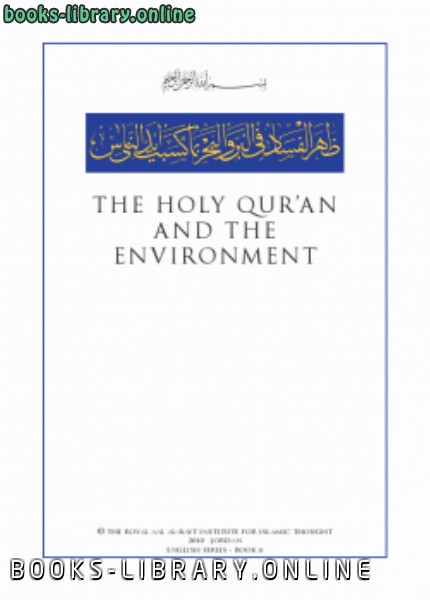
THE HOLY QURAN AND THE ENVIRONMENT PDF
قراءة و تحميل كتاب THE HOLY QURAN AND THE ENVIRONMENT PDF مجانا
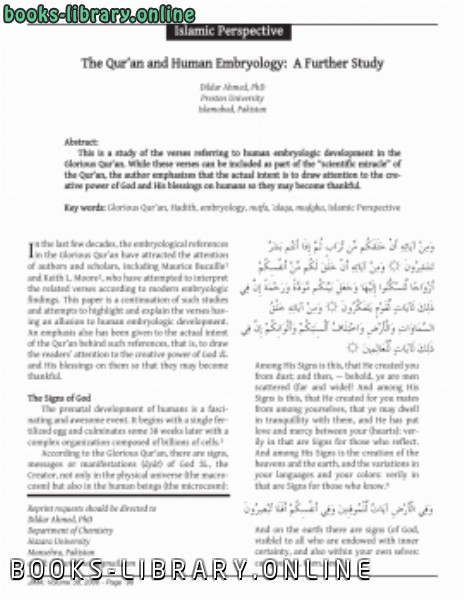
The Quran and Human Embryology A Further Study PDF
قراءة و تحميل كتاب The Quran and Human Embryology A Further Study PDF مجانا

MODERN TECHNOLOGY AND THE DEHUMANIZATION OF MAN PDF
قراءة و تحميل كتاب MODERN TECHNOLOGY AND THE DEHUMANIZATION OF MAN PDF مجانا
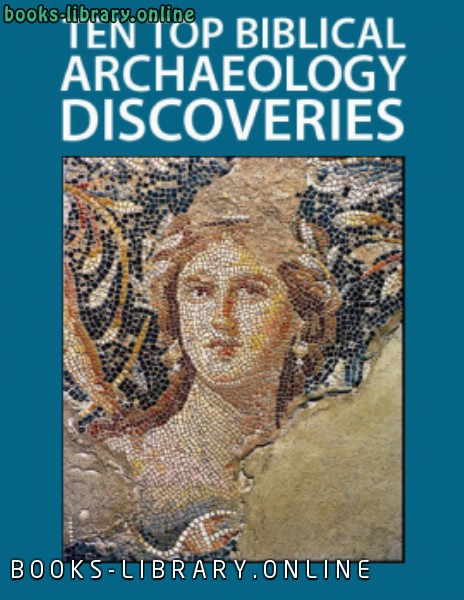
Ten Top Biblical Archaeology Discoveries PDF
قراءة و تحميل كتاب Ten Top Biblical Archaeology Discoveries PDF مجانا
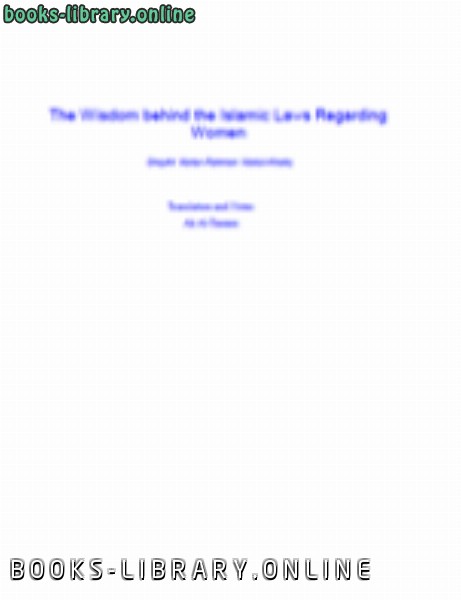
The Wisdom behind Laws Regarding Women PDF
قراءة و تحميل كتاب The Wisdom behind Laws Regarding Women PDF مجانا
